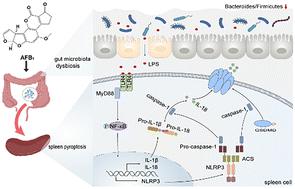当前位置:
X-MOL 学术
›
Food Funct.
›
论文详情
Our official English website, www.x-mol.net, welcomes your
feedback! (Note: you will need to create a separate account there.)
Aflatoxin B1 exposure causes splenic pyroptosis by disturbing the gut microbiota-immune axis
Food & Function ( IF 5.1 ) Pub Date : 2024-03-12 , DOI: 10.1039/d3fo04717b Huodai Chen 1 , Lin Ye 1 , Yurun Wang 1 , Jiahong Chen 1 , Jie Wang 1 , Xueling Li 1 , Hongtao Lei 1, 2, 3 , Yunle Liu 1, 2, 3
Food & Function ( IF 5.1 ) Pub Date : 2024-03-12 , DOI: 10.1039/d3fo04717b Huodai Chen 1 , Lin Ye 1 , Yurun Wang 1 , Jiahong Chen 1 , Jie Wang 1 , Xueling Li 1 , Hongtao Lei 1, 2, 3 , Yunle Liu 1, 2, 3
Affiliation

|
Aflatoxin B1 (AFB1) causes serious immunotoxicity and has attracted considerable attention owing to its high sensitivity and common chemical–viral interactions in living organisms. However, the sensitivity of different species to AFB1 widely varies, which cannot be explained by the different metabolism in species. The gut microbiota plays a crucial role in the immune system, but the interaction of the microbiota with AFB1-induced immunotoxicity still needs to be determined. Our results indicated that AFB1 exposure disrupted the structure of the gut microbiota and damaged the gut barrier, which caused translocation of microbiota metabolites, lipopolysaccharides, to the spleen. Subsequently, pyroptosis of the spleen was activated. Interestingly, AFB1 exposure had little effect on the splenic pyroptosis of pseudo-germfree mice (antibiotic mixtures eliminated their gut microbiota, ABX). Then, fecal microbiota transplant (FMT) and sterile fecal filtrate (SFF) were employed to validate the function of the gut microbiota and its metabolites in AFB1-induced splenic pyroptosis. The AFB1-disrupted microbiota and its metabolites significantly promoted splenic pyroptosis, which was worse than that in control mice. Overall, AFB1-induced splenic pyroptosis is associated with the gut microbiota and its metabolites, which was further demonstrated by FMT and SFF. The mechanism of AFB1-induced splenic pyroptosis was explored for the first time, which paves a new way for preventing and treating the immunotoxicity from mycotoxins by regulating the gut microbiota.
中文翻译:

黄曲霉毒素 B1 暴露通过扰乱肠道微生物群-免疫轴导致脾焦亡
黄曲霉毒素 B 1 (AFB 1 ) 会引起严重的免疫毒性,并且由于其高敏感性和在生物体中常见的化学-病毒相互作用而引起了广泛关注。然而,不同物种对AFB 1的敏感性差异很大,这不能用物种内代谢的不同来解释。肠道微生物群在免疫系统中发挥着至关重要的作用,但微生物群与 AFB 1诱导的免疫毒性的相互作用仍需确定。我们的结果表明,AFB 1暴露破坏了肠道微生物群的结构并损害了肠道屏障,从而导致微生物群代谢物脂多糖易位至脾脏。随后,脾脏焦亡被激活。有趣的是,AFB 1暴露对假无菌小鼠的脾焦亡几乎没有影响(抗生素混合物消除了它们的肠道微生物群,ABX)。然后,采用粪便微生物群移植(FMT)和无菌粪便滤液(SFF)来验证肠道微生物群及其代谢物在AFB 1诱导的脾焦亡中的功能。 AFB 1破坏的微生物群及其代谢物显着促进脾焦亡,这比对照小鼠更严重。总体而言,AFB 1诱导的脾焦亡与肠道微生物群及其代谢物相关,FMT 和 SFF 进一步证明了这一点。 首次探讨了AFB 1诱导脾焦亡的机制,为通过调节肠道菌群防治霉菌毒素免疫毒性开辟了新途径。
更新日期:2024-03-12
中文翻译:

黄曲霉毒素 B1 暴露通过扰乱肠道微生物群-免疫轴导致脾焦亡
黄曲霉毒素 B 1 (AFB 1 ) 会引起严重的免疫毒性,并且由于其高敏感性和在生物体中常见的化学-病毒相互作用而引起了广泛关注。然而,不同物种对AFB 1的敏感性差异很大,这不能用物种内代谢的不同来解释。肠道微生物群在免疫系统中发挥着至关重要的作用,但微生物群与 AFB 1诱导的免疫毒性的相互作用仍需确定。我们的结果表明,AFB 1暴露破坏了肠道微生物群的结构并损害了肠道屏障,从而导致微生物群代谢物脂多糖易位至脾脏。随后,脾脏焦亡被激活。有趣的是,AFB 1暴露对假无菌小鼠的脾焦亡几乎没有影响(抗生素混合物消除了它们的肠道微生物群,ABX)。然后,采用粪便微生物群移植(FMT)和无菌粪便滤液(SFF)来验证肠道微生物群及其代谢物在AFB 1诱导的脾焦亡中的功能。 AFB 1破坏的微生物群及其代谢物显着促进脾焦亡,这比对照小鼠更严重。总体而言,AFB 1诱导的脾焦亡与肠道微生物群及其代谢物相关,FMT 和 SFF 进一步证明了这一点。 首次探讨了AFB 1诱导脾焦亡的机制,为通过调节肠道菌群防治霉菌毒素免疫毒性开辟了新途径。











































 京公网安备 11010802027423号
京公网安备 11010802027423号